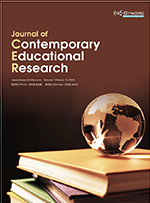Abstract
The high-quality development of a country driven by talent necessitates comprehensive and practical STEM (Science, Technology, Engineering, and Mathematics) education. The goal of localizing STEM education is to cultivate comprehensive innovative technology talents that meet the needs of the new era. STEM teachers play a core role in this concept, and the quality of teacher training directly determines the development trend of STEM education and the quality of future talents in the country. Therefore, based on the current situation and existing problems in STEM teacher training, the shared commitment to “high-quality STEM teacher training” is employed as a guiding principle, highlighting the role of various elements in the STEM teacher training process. The practical path for STEM teacher training is proposed from four aspects: top-level design goal orientation, resource integration to solve supply imbalance, curriculum construction to improve the teaching system, and sustainable development to enhance professional ability. This study hopes to provide guidelines for innovative training of localized STEM teachers in China.
References
Ministry of Education of the People’s Republic of China, 2022, Notice of the Ministry of Education on the Issuance of Compulsory Education Curriculum Plan and Curriculum Standards (2022 edition), viewed August 25, 2023. http://www.moe.gov.cn/srcsite/A26/s8001/202204/t20220420_619921.html
Yuan L, Zheng K, Zhang Z, 2020, STEM Education: Problems and Reflections. Journal of Open Education Research, 26(03): 51–57 + 90.
Yu SQ, Hu X, 2015, STEM Education Concept and Interdisciplinary Integration Model. Open Education Research, 21(04): 13–22.
Gilbert M, 2013, Joint Commitment: How We Make the Social World, Oxford University Press, New York.
Gilbert M, 1989, On Social Facts, Routledge, New York.
Mao G, Bi Q, 2023, A Study on the Localization Experience of Teacher Development from Subject Teaching to STEM Education. Teacher Education Research, 35(01): 102–108.
Yu X, 2021, An Example Analysis of STEM Teacher Training Model Oriented Towards Higher Order Thinking. Teacher Training for Primary and Secondary Schools, 2021(5): 6–11. http://doi.org/10.3969/j.issn.1005-1058.2021.05.002
Huang L, Zhao N, Dai X, 2020, International Experience and Inspiration of School-Based Development of STEM Curriculum. Modern Distance Education, 2020(1): 91–96. http://doi.org/10.3969/j.issn.1001-8700.2020.01.011
Li Y, Dong X, Li X, et al., 2019, Construction of STEM Education Quality Evaluation Index System. Modern Distance Education Research, 32(2): 48–55, 72.
Lin J, Shi X, Wei W, 2019, Problems and Countermeasures of STEM Education in Primary School Science Curriculum. Curriculum. Teaching Methods, 39(3): 108–112.
Liu S, 2018, Practice Research of STEM Education in Practice Base. Theoretical Research and Practice of Innovation and Entrepreneurship, 1(19): 69–70.
Hu Y, 2022, Research on Current Situation and Influencing Factors of High School Chemistry Teachers’ Understanding of STEM Education, dissertation, Central China Normal University, Hubei.
He Y, 2021, Research on the Penetration of STEM Education in High School Biology Teaching, dissertation, Hunan Normal University, Hunan.
Shi W, 2021, A Study on the Influencing Factors of STEM Teachers’ Knowledge and Development, dissertation, Qufu Normal University, Shandong.
Ma J, 2020, Research on Structural Model of Middle School STEM Teachers’ Teaching Ability, dissertation, Henan University, Henan.
